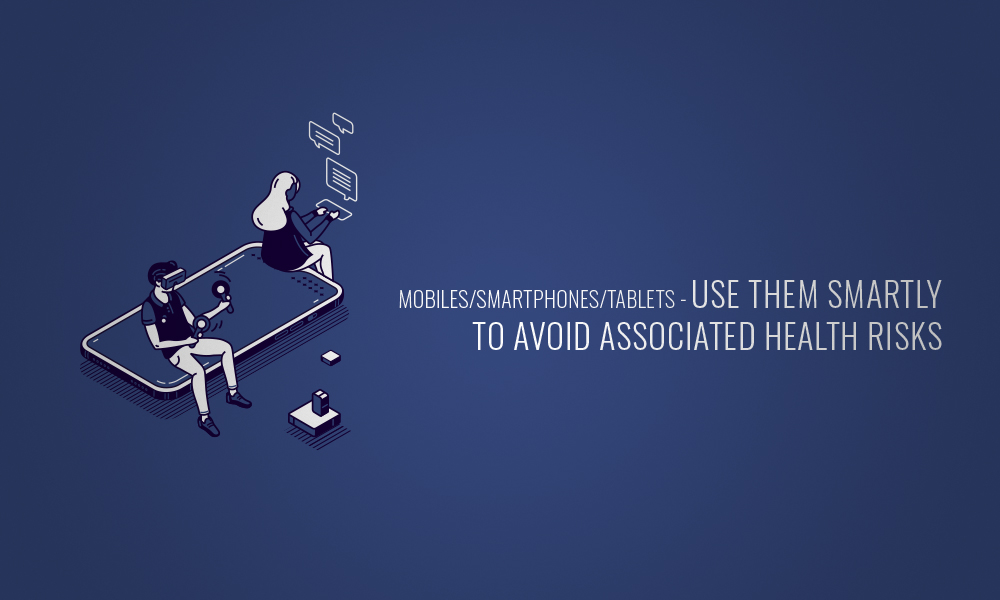This column endeavours to dwell upon the modern research findings to keep us all aware/updated about the possible risks of our integral tech-infused lifestyle. So let's go ahead and see what research inferences are cautioning us about, and how we can outsmart the smartphones and other hand-held devices to minimize their health risks.
The Chartered Society of Physiotherapy (CSP; a healthcare society) recently reported that working on smartphones/tablets even while commuting or after getting back home has made people “screen slaves.” “Hand-held devices are increasingly making people work beyond office, with nearly two-thirds of the people continuing to work outside office hours on their handheld devices at an average of extra 2 hours every day, apart from 6 and 1/2 hours of regular office time”– reported the study findings of CSP. Interestingly, if we add the leisure time or travel time (for some over 4-5 hours) we are glued to smartphones/tablets apart from work, we would realise that the 'screen indeed rules our lives today.' Somebody rightly said, “We don't own our phone; rather, the phone owns us.”
EYE PROBLEMS, POSTURAL ISSUES, AND STRESS WITH EXCESSIVE USE
Research shows that as people struggle to concentrate on small screens and little fonts on smartphones/mobiles/tablets, they blink less (especially on subways, metros, or buses), leading to eye strain, headache, dry eyes, red sore eyes, and blurred vision apart from irritation. Further, most people have postural problems while looking down at these hand-held devices for a long time, especially when they do so while traveling and beyond the workplace. Most people using these devices outside their workplace are not maintaining the posture compared to that at a workplace, which causes strain in the neck and shoulders, apart from causing pain (Turtle Neck Syndrome). Somebody remarked in a lighter vein, “When people first started using mobiles/smartphones, they thought it was pain-in-the-neck, for it made them accessible 24x7, but they never knew that it would actually cause a pain in the neck.”
“Postural problems are the leading health risk of hand-held devices, even when used at workplace, as fewer than 25% users were seen to take care or think about their posture while working in front of screens at their workplace/office,” the CSP research findings reported. Further, findings showed that regularly working extra in the evenings puts one at an increased risk of back and neck pain, along with stress-related illness. “People need to learn to talk to managers about excessive workload and learn to discipline themselves by switching off their smartphones after office to cut down the screen-time,” commented the chairwoman of the CSP, Dr Helena Johnson.
Interestingly, earlier in 2009 too, The Canadian Physiotherapy Association issued a similar advice and warned that extended use of touchscreen devices (smartphones/tablets) in awkward positions could lead to stiffness, and muscle/joint pain.
Also, smartphones/mobiles were linked to stress and behavioural problems (predominantly irritation) in 16% users in a study done in the University of Staffordshire. Another study showed that blood pressure became lower in those who had given up using mobiles/smartphones or cut down its use, indicative of its stress-inducing potential. Further, prolonged exposure to hand-held devices for stressed out work schedules as shown globally also adds to mental stress, leading to mental problems like anxiety and depression.
MINIMIZING HEALTH-RISK OF HAND-HELD DEVICES
1. To ward off eye risks of smartphones/tablets, it is recommended not to hold them close. Increase the font size, and give eyes rest by taking regular and frequent in-between short breaks and gazing into distance for a couple of minutes.
2. Bending the head down should be avoided while using these gadgets for a long time. A few minutes of rest should be given every hour or two, with the neck and shoulders straightened/stretched during the rest period. Also, regular physical activity with yoga sessions would take care of strained back and neck.
3. While individuals need to be made aware, employers should also help their staff by counselling on better working habits, doing yoga postures or physical activity at gyms, and make them aware of the importance of maintaining good posture on-screen.
HAND-HELD DEVICES: THERE IS MORE TO IT!
Environmentalists claim that smartphones/mobiles are damaging our environment and consequently our health. But, to forsake them is beyond the scope of the present article. In fact, other studies across the globe also suggest mobile screens to be transmitting viral infections through our fingertips. Moreover, smartphones/ mobiles have also been implicated in destroying our focus and creating stress in most people as they obsessively kept checking their menu screen, news, e-mail, and apps regularly in spite of no new information coming. Further, radiations from mobiles/smartphones have been linked to brain tumour/cancer, sleep disturbances, and infertility in men who keep cell phones in their trouser pocket. We would undoubtedly like to ponder over these health risks caused by smartphones and other hand-held devices in one of our future issues.
Therefore, stay tuned with us and keep striving towards a perfect state of good health, physically, mentally, and socially. We would do our best to empower you in doing so. Good day!


A great article for the current generation. This generation believes technology is life! Jmjk